Gdynia Maritime University Professor Bradford Parkinson Conferred Honorary Title of Doctor honoris causa
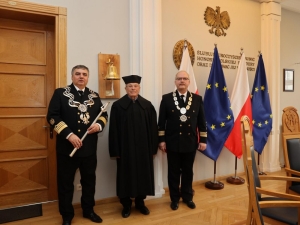
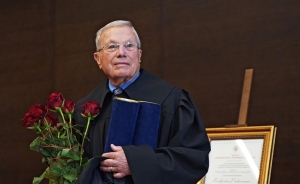
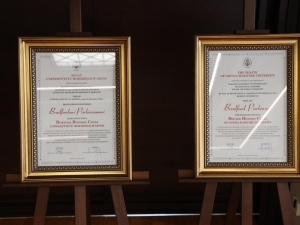
Professor Bradford Parkinson of the University of Stanford, California, was awarded the Honorary Title of Doctor honoris causa of Gdynia Maritime University on Thursday 21 March 2024. The honorary title is one of the most prestigious titles conferred in the academic world. Gdynia Maritime University has to date conferred the title six times.
Professor Bradford Parkinson – the “Father of GPS” – of Stanford University was honoured by Gdynia Maritime University with the honorary title of Doctor honoris causa. The Professor personally oversaw the launch of the first GPS satellites into orbit, their coordination and pre-launch testing and is the inventor of many innovative applications for GPS. The innovation of his work has been confirmed by seven patents. Professor Parkinson has been honoured with many awards and distinctions for his scientific and professional activity. One of the most important awards is the Queen Elizabeth Award, which was presented to the entire team responsible for the architecture and development of GPS in 2019 by the Prince of Wales (now King Charles III).
In his opening speech, the President of Gdynia Maritime University reminded those present of the momentousness of the occasion connected with the conferral ceremony of the 50th anniversary of the launch of the NAVSTAR Global Positioning System, which fully revolutionised air, marine, and land navigation, of which he was the main architect as the Head of the United States Air Force’s (USAF) NAVSTAR GPS Joint Programme Office, is the great visionary Professor Bradford Parkinson.
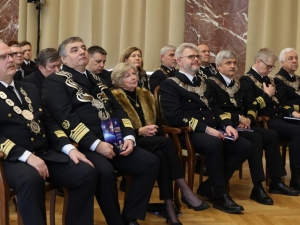
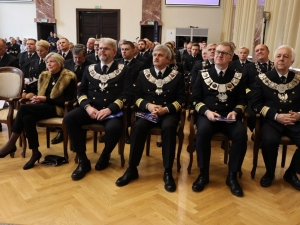
HM The President of Gdynia Maritime University highlighted also that:
The motion to confer the Honorary Title of Doctor honoris causa on Professor Bradford Parkinson was supported by the senates of four higher education institutions: Warsaw University of Technology, the Polish Naval Academy, the Polish Air Force University, and Gdynia Maritime University. The reviewers, as part of the conferral procedure, were Professor Jarosław Bosy of Wrocław University of Environmental and Life Sciences, Professor Stanisław Oszczak of the Polish Air Force University, and Professor Zbigniew Burciu of Gdynia Maritime University.
Professor Weintirt also highlighted that effects of the launch of the Global Positioning System in 1973 on the world:
Today, billions of people around the world rely on the enormous engineering infrastructure that is GPS, which covers the entire planet and reaches into space. Thanks to the ability of the satellite system to accurately pinpoint the location of receivers and a well-designed map, we can reach our destination without even knowing the route.
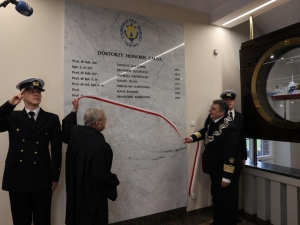
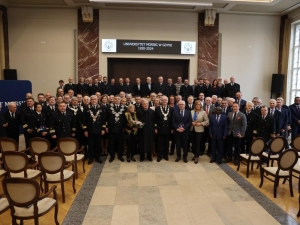
A laudation was given at the ceremony by Professor Krzysztof Czaplewski. The promoter underlined the global significance of the work of Professor Parkinson.
Without the personal involvement of Professor Parkinson, modern transportation would not be what it is today. There would be no electronic banking or popular VOD services.
He also paid tribute to other achievements of the inventor:
the Wide Area Augmentation System (WASS), mainly used in air transport. The U.S. GPS Satellite Support System increases the accuracy of the determination of the horizontal position by a GPS receiver to 2-3 meters. GPS receivers, assisted by the WAAS system, use corrections when calculating their positions to improve the accuracy of determined positions. The Professor is also the author of other innovations in using satellite systems, such as the blind landing of Boeing 737 aircraft using GPS alone.
Following the laudation, the President of Gdynia Maritime University, Professor Adam Weintrit, read the act for the conferral of the Honorary title of Doctor honoris causa. This was followed by the ceremonial presentation of the Doctor honoris causa Diploma to the Honorary Doctor, Professor Bradford Parkinson.
Professor Parkinson then took to the floor to give a talk specially prepared for the occasion, beginning with the following words of appreciation:
I would like to thank HM The Rector of Gdynia Maritime University, Profesor Adam Weintrit, for this very prestigious recognition. I would also like to thank Profesor Krzysztof Czaplewski. My gratitude goes also to the members of the Senate and distinguished Reviewers who were so appreciative of my research work which was reflected in the symbolic, yet moving ceremony of the conferral of the honorary title of Doctor honoris causa.
Professor Bradford Parkinson then shared the detailed history of how the GPS project came to fruition. His account drew attention to the many turning points when the success of the project was uncertain:
Let us go back a little over 50 years. I experienced my greatest failure. I was a young Air Force colonel. I had flown across the country from my base in Los Angeles over to Washington D.C. I was giving a briefing to the highest-level decision board in the Department of Defense. It was a large conference room, filled with generals and very senior civilians. I had been recently appointed to head up a research project and I wanted to put on a demonstration of a new satellite navigation system. At the end of that meeting, I stepped out of the room, and when I came back they announced the decision. It was unanimous. No. They didn’t want to do that. As a result, we tended to call that the Black Thursday. (…) Somehow, we recovered from that, so although we called it Black Thursday, it was really Gold Thursday, for reasons I will tell you about. About four months later I got that reversed and by December 1973, just almost exactly a little over 50 years ago, we were granted approval. I’d like to thank you all for helping us celebrate our revolution.
